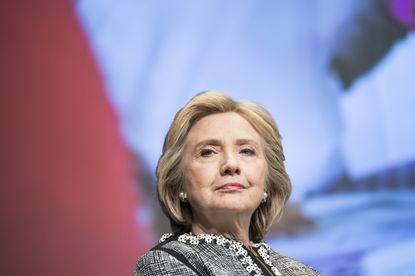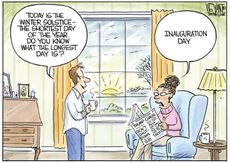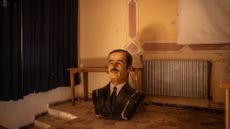4 debate questions for Hillary Clinton, courtesy of Black Lives Matter
Time for the Democratic frontrunner to get specific about police abuse

When Hillary Clinton takes the stage Tuesday at the first Democratic debate of the 2016 presidential election, it's a forgone conclusion that she will have the overwhelming support of black voters.
It's not clear why.
As first lady, Hillary Clinton vehemently advocated for one of the most destructive policies of her husband's presidency: the 1994 crime bill, a "tough on crime" relic credited with increasing the U.S. prison population by 673,000 inmates.
Subscribe to The Week
Escape your echo chamber. Get the facts behind the news, plus analysis from multiple perspectives.

Sign up for The Week's Free Newsletters
From our morning news briefing to a weekly Good News Newsletter, get the best of The Week delivered directly to your inbox.
From our morning news briefing to a weekly Good News Newsletter, get the best of The Week delivered directly to your inbox.
"There will be more police on the street, a hundred thousand more police officers, with flexibility given to local communities to determine how best to use them," she said at a 1994 conference for female police officers advocating the bill. "We will be able to say, loudly and clearly, that for repeat, violent, criminal offenders — three strikes and you're out. We are tired of putting you back in through the revolving door."
It's a stance for which she still has a lot of atoning to do.
While former President Bill Clinton has expressed regret over the bill he once championed, Hillary has not. It's a point of contention with the Black Lives Matter movement, founded after the killing of unarmed black teen Michael Brown at the hands of white police officer Darren Wilson last year. When members of its Boston chapter asked Clinton during a campaign stop in New Hampshire nearly two months ago about the mistakes she made in support of the bill, she ducked the question and never apologized.
Even during a recent interview with BuzzFeed, she refused to acknowledge her personal role in the mass incarceration complex of the 1990s. Her lack of self-reflection should be of great concern to black voters as she prepares to face questions about her criminal justice and police reform policies Tuesday night. Despite offering vague promises around body cameras and ending an "era of mass incarceration," Hillary Clinton has failed to give specifics on meaningful police reform policies she would pursue as president. CNN shouldn't let her off the hook.
Here are four questions the moderators should ask her at Tuesday night's debate:
1. Beyond body cameras, are you willing to push for legislation that will punish police officers who do not belong on the force?
It is nearly impossible to fire police officers over bad conduct. As CBS News found in 2013, even when police chiefs fire officers for abuse, they stand a good chance of being reinstated because of arbitration and union rules. In Washington state, Spokane County Sheriff Ozzie Knezovich had to retain several cops he fired for abusing their power. When he drafted a bill that would make it easier for police chiefs to fire bad cops, the legislation died in committee in 2013. As president, would Clinton take up Knezovich’s bill at the federal level?
2. Will you challenge the doctrine of qualified immunity, which protects police officers from civil lawsuits while conducting police business?
This doctrine protects officers from being sued in civil court, as long as their actions don’t violate the U.S. Constitution or a statutory right. The U.S. Supreme Court upheld the doctrine twice, most recently in 2014. Of course, we all know that police officers’ jobs are dangerous. But should it really be legal for a cop to not even have to stand before a jury of his or her peers to face civil charges for their actions? Will Clinton throw the weight of the presidency behind another challenge to the Supreme Court?
3. Should states require that police officers' personnel records be open to the public?
In many states, a police officer's personnel records are not available to the public. So if a bad cop has been disciplined for behavior that violates a citizen's civil rights, that punishment is protected by state law. As public servants, such protections are ridiculous and need to be challenged. If a cop has engaged in conduct that has harmed the public or disgraced the uniform, the public should know. Does Clinton agree?
4. Should law enforcement agencies at the federal, local, and state levels be required to release body camera footage, unedited, in 48 hours or less?
While the use of video has captured devastating acts of police brutality, much of the most publicized abuse was filmed by bystanders' cellphones, not police officers' body cameras. In fact, in Denver, Colorado, an inspector general report found that police officers' cameras recorded just one out of four use-of-force incidents during its six-month pilot program. And some states still make it difficult for body camera footage to be released to the public, even though the equipment and the cops who use it are supported with taxpayer dollars. Would Clinton support a policy to make these videos automatically public?
Her responses to these questions would be very revealing about her commitment to true police reform. That is, of course, if she is even interested in enacting it at all.
"Look, I don't believe you change hearts," Clinton told Black Lives Matters protesters in August. "I believe you change laws, you change allocation of resources, you change the way systems operate."
Time for Clinton to detail what those laws will be.
Sign up for Today's Best Articles in your inbox
A free daily email with the biggest news stories of the day – and the best features from TheWeek.com
Terrell Jermaine Starr is a New York City-based journalist who covers U.S. and Russian politics. His twitter handle is @Russian_Starr.
-
 Today's political cartoons - December 22, 2024
Today's political cartoons - December 22, 2024Cartoons Sunday's cartoons - the long and short of it, trigger finger, and more
By The Week US Published
-
 5 hilariously spirited cartoons about the spirit of Christmas
5 hilariously spirited cartoons about the spirit of ChristmasCartoons Artists take on excuses, pardons, and more
By The Week US Published
-
 Inside the house of Assad
Inside the house of AssadThe Explainer Bashar al-Assad and his father, Hafez, ruled Syria for more than half a century but how did one family achieve and maintain power?
By The Week UK Published
-
 US election: who the billionaires are backing
US election: who the billionaires are backingThe Explainer More have endorsed Kamala Harris than Donald Trump, but among the 'ultra-rich' the split is more even
By Harriet Marsden, The Week UK Published
-
 US election: where things stand with one week to go
US election: where things stand with one week to goThe Explainer Harris' lead in the polls has been narrowing in Trump's favour, but her campaign remains 'cautiously optimistic'
By Harriet Marsden, The Week UK Published
-
 Is Trump okay?
Is Trump okay?Today's Big Question Former president's mental fitness and alleged cognitive decline firmly back in the spotlight after 'bizarre' town hall event
By Harriet Marsden, The Week UK Published
-
 The life and times of Kamala Harris
The life and times of Kamala HarrisThe Explainer The vice-president is narrowly leading the race to become the next US president. How did she get to where she is now?
By The Week UK Published
-
 Will 'weirdly civil' VP debate move dial in US election?
Will 'weirdly civil' VP debate move dial in US election?Today's Big Question 'Diametrically opposed' candidates showed 'a lot of commonality' on some issues, but offered competing visions for America's future and democracy
By Harriet Marsden, The Week UK Published
-
 1 of 6 'Trump Train' drivers liable in Biden bus blockade
1 of 6 'Trump Train' drivers liable in Biden bus blockadeSpeed Read Only one of the accused was found liable in the case concerning the deliberate slowing of a 2020 Biden campaign bus
By Peter Weber, The Week US Published
-
 How could J.D. Vance impact the special relationship?
How could J.D. Vance impact the special relationship?Today's Big Question Trump's hawkish pick for VP said UK is the first 'truly Islamist country' with a nuclear weapon
By Harriet Marsden, The Week UK Published
-
 Biden, Trump urge calm after assassination attempt
Biden, Trump urge calm after assassination attemptSpeed Reads A 20-year-old gunman grazed Trump's ear and fatally shot a rally attendee on Saturday
By Peter Weber, The Week US Published